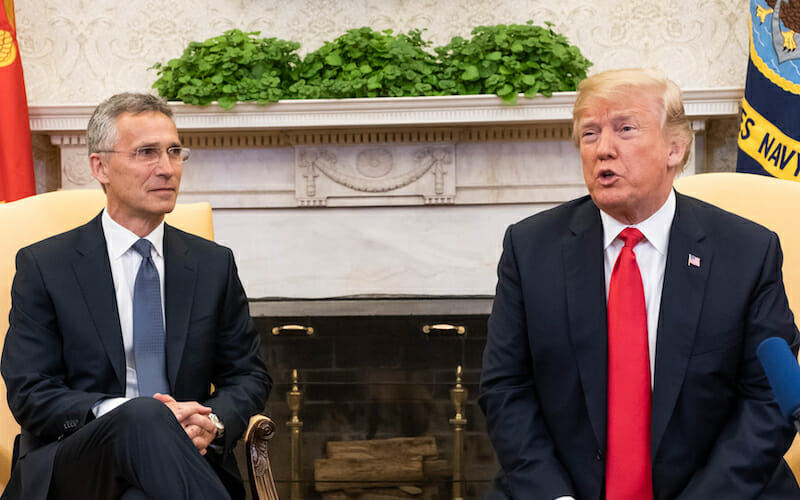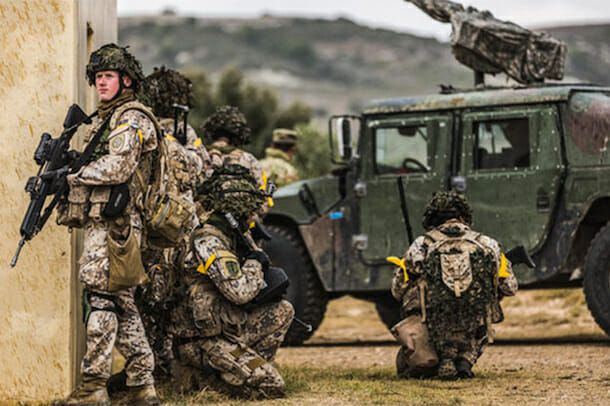
How NATO Can Avoid a New Cold War
On July 11-12, NATO will hold a summit in Brussels to discuss a new strategic path for the alliance. Many hope for stronger ties among the Western allies during this time of political dysfunction. Meanwhile, Russia and China are strengthening their own relations and are poised to challenge the unipolar power structure that the West has enjoyed since the collapse of the Soviet Union. However, this does not necessarily mean the beginning of a new Cold War as NATO and Russia still have an opportunity to deescalate tensions. A variety of political and economic factors, as well as good timing, have created incentives for both sides to establish dialogue and work toward cooperation.
During the last two years, NATO has seen its internal relations weaken and tensions rise due to a series of events including Brexit, U.S. withdrawal from the Paris Climate Agreement, and more recently, the ensuing trade war between the U.S. and its allies. In addition, President Trump has heavily criticized NATO members that do not fulfill their annual obligations by contributing at least two percent of respective GDP to defense.
The July summit will be an opportunity for NATO leaders to unify themselves and to establish a clear security policy to strengthen Europe. The primary agenda for the meeting will be to establish a strategy to improve military readiness and security in the Baltic States while also maintaining openness to dialogue and better relations with Moscow. In 2017, NATO deployed an enhanced forward presence in the Baltic States, Poland, and the Black Sea region to deter Russian aggression and promote collective defense. More recently, on June 3, approximately 18,000 NATO troops began the annual U.S. led, Saber Strike, military exercises in Poland to improve readiness and defense posture in Eastern Europe. NATO members will also seek to establish a new Joint Forces Atlantic Command on the East Coast of the United States, a logistics command in Germany, and a cyber security center.
While NATO strives to improve its internal relations and its strategy to defend against the Russian threat in Eastern Europe, Russia has turned to China for economic and military support. In early June, Russian President Vladimir Putin and Chinese President Xi Jinping met, along with several other leaders, for the 2018 Shanghai Cooperation Organization (SCO) Summit. SCO consists of eight member states including China, Russia, India, Pakistan, and several former Soviet-bloc Central Asian countries. The June Summit generated considerable optimism about improving relations in the East; while Western nations took a step backward at the G7 Summit in Canada. The more united and assertive SCO becomes, the more likely SCO could be a potential rival to NATO. Some would even argue that SCO is already a direct threat to Western security. However, SCO is not yet as unified as NATO because the member states face a variety of historical, cultural and identity differences. For example, Pakistan and India, the two most recent members, are regional rivals and India opposes the Belt and Road Initiative that would bolster China’s global economic power.

Nonetheless, the potential success of SCO highlights the emerging relationship between Russia and China. The two SCO countries are similar in many ways and their interests seem to align more often than not. Furthermore, both countries have a mutual interest in limiting American influence and shifting the global power structure away from one dominated by Western diplomacy.
This warming relationship between Russia and China isn’t new. After all, the two powers share a 2,500 mile border and have economies dominated by state-run firms and oligarchs. In the last decade, trade between Russia and China has seen a six-fold increase and last year the two countries completed the largest gas deal in history.
Along with improving trade ties, Russia and China are steadily increasing their military cooperation. Russia sells an estimated $1 billion in arms annually to China. While there are some concerns in Moscow that China will reverse engineer Russian military equipment, the higher level of arms sales has generally been accompanied by greater military cooperation. In July 2017, Chinese warships participated in joint military drills with Russia in the Baltic Sea and the two countries announced in April that they will hold war games in the Asia-Pacific. It is not surprising that Russia and China would seek to form a strategic alliance in the East. The two countries have been known to resist Western dominance as Moscow and Beijing have their own ambitions to expand global reach. In the past few years, Russia has annexed Crimea and supported a separatist movement to destabilize Ukraine. Similarly, China has expanded its influence by disputing control of islands in the South China Sea and establishing its first permanent overseas deployment in Djibouti last year.
This political partnership was inevitable given the events of the last few years. After diplomatic and economic relations between Russia and the West deteriorated in 2014, Russia became completely isolated from the NATO countries. This opened the door for China to become a close ally. The timing of Russia’s resurgent nationalism also couples well with China’s appetite for military modernization and expanded global influence.
NATO needs to take effective steps to establish a constructive dialogue with Russia and attempt to reconnect it with the West. It is in the interest of both NATO and Russia to soften tensions and develop a path to strong economic relations. Russia needs to negotiate for a loosening of Western sanctions that have critically damaged its economy. In addition, the growing partnership with China is not necessarily the best option for Russia. Both Russia and China do not want to see this power struggle become a deadlock between the West and the East. China also poses a threat to Russia’s influence in Central Asia. China’s increased interest to develop infrastructure in the region’s former Soviet-bloc countries encroaches on Russia’s sphere of influence and could cause concern in Moscow.
Part of this opportunity for NATO also coincides with developments in the international oil markets. Russia needs to expand its customer base for oil exports to the Western economies or it could find its oil prices under pressure from China’s strong buying power. Recent sanctions from the Trump administration on Iranian oil have created anticipation for a global supply shortage in the industry. Many countries are expected to seek other buyers by the end of the year or risk being locked out of the U.S. banking system. The problem is that most other major oil producers including Libya, Canada, and Venezuela are experiencing production shortages of their own. Russia and Saudi Arabia are the only major producers with the capacity to increase production and meet excess demand in the global oil market. Therefore, it comes as no coincidence that the Trump administration has proposed a July meeting between President Trump and President Putin on the heels of U.S. imposed sanctions on Iranian oil. The rest of Europe will likely disapprove of Trump’s willingness to speak with Putin. However, in this case they should follow the U.S. initiative to negotiate with Russia.
NATO members should seek to calm security concerns in Eastern Europe while also strengthening internal cooperation. NATO cannot afford continued dysfunction and must find a way to maintain confidence in its members’ ability to create a comprehensive security policy. In addition, NATO should seek to weaken the Russia-China partnership if its members wish to maintain political and military dominance. If NATO can soften China’s growing partnership with Russia, it will weaken China’s ability to compete with the West for global influence. For that reason, the NATO summit should prioritize efforts to continue positive dialogue with Russia as it is likely that Russia will be willing to negotiate with the West. Nonetheless, while this appears to be an optimistic step, NATO must still hedge its bets by bolstering its defense posture in the Baltic region if tensions continue to develop with Moscow.

